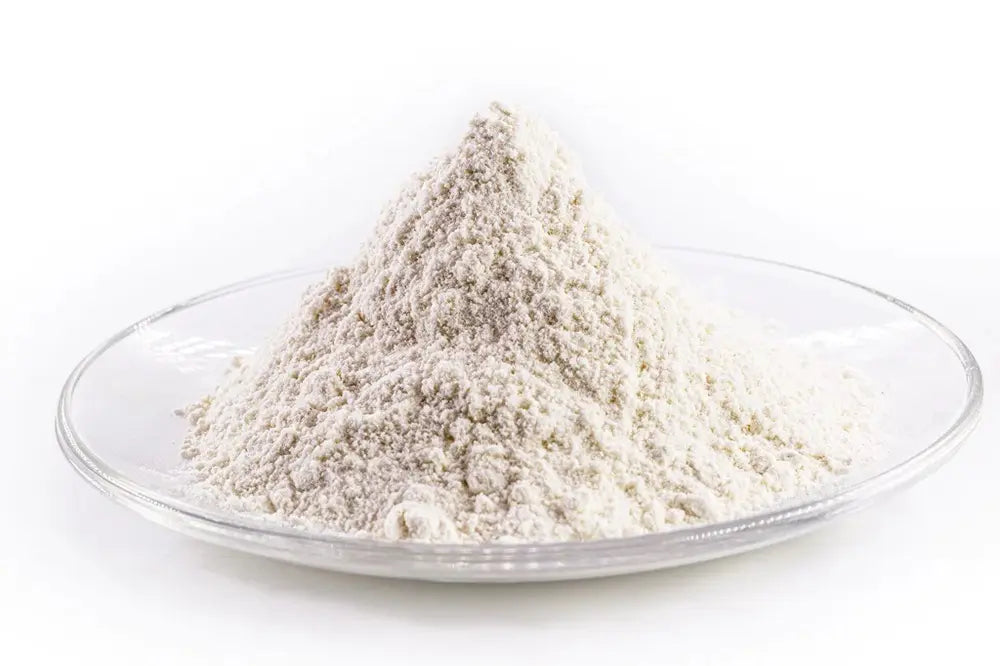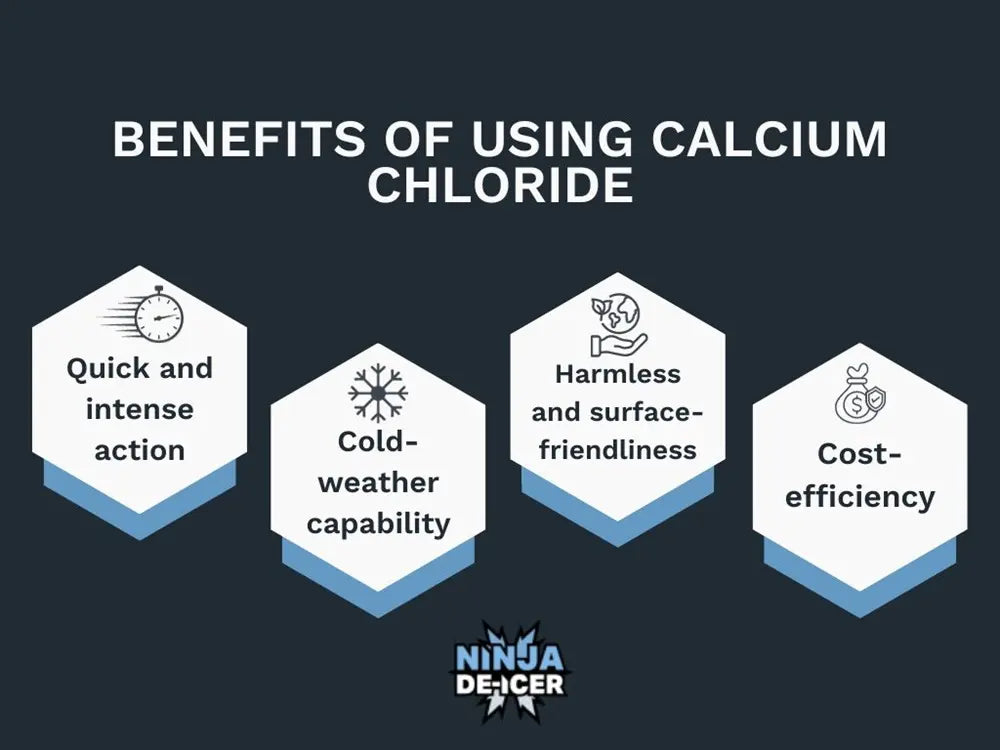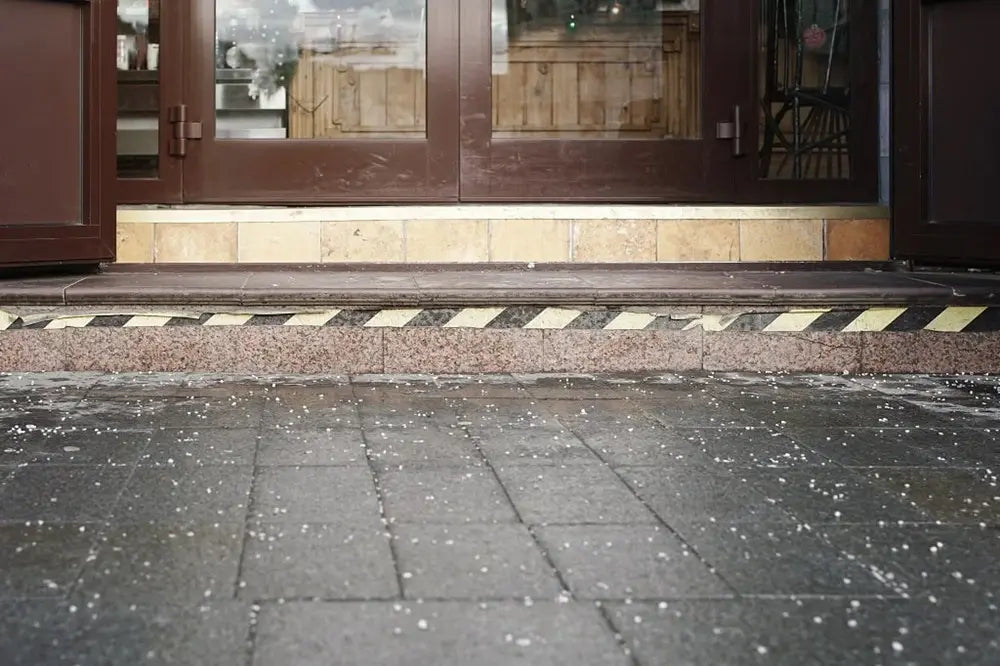
Calcium Chloride Ice Melt for Snow and Ice Management
Winter's freezing temperatures and heavy snowfall present endless challenges for businesses trying to maintain safe, accessible property. Slippery sidewalks and parking lots create hazardous conditions that require diligent snow and ice management. While traditional rock salt (sodium chloride) helps, it has limitations in extreme cold.
When the temps drop too low and sodium chloride doesn't quite work as well as it normally would, calcium chloride ice melt is a game-changing solution. With its ability to work at temperatures as low as -25ºF, melt ice faster, and penetrate thicker ice, calcium chloride offers superior snow and ice control. Let's take a closer look at how this advanced ice melt enhances winter safety and accessibility.
What Is Calcium Chloride?

Calcium chloride is a vital snow and ice melting tool, but what exactly is this unique compound? Calcium chloride is an ionic salt made of calcium and chlorine ions bonded together. It is highly hygroscopic, meaning it readily attracts water molecules from the surrounding environment through absorption. When mixed with water, calcium chloride also releases heat in an exothermic reaction. These special properties allow it to work as an effective de-icer by pulling moisture from the air and snow to form an exothermic liquid brine. This brine melts ice and snow by both inhibiting bonding and generating its own thermal energy.
Benefits of Using Calcium Chloride for Snow and Ice Management
Calcium chloride provides superior performance for snow and ice management due to its many benefits.
Immediate and Powerful Action
Unlike traditional rock salt which can take a little more time to begin working, calcium chloride starts melting ice immediately upon contact. It rapidly forms an exothermic brine that quickly breaks the bonds holding ice and snow particles together. This allows calcium chloride products to clear thick layers of snow and penetrate through ice much faster than other methods. The powerful de-icing action makes calcium chloride extremely effective for the toughest snow removal.
Low-Temperature Performance
Calcium chloride offers a distinct advantage in snow and ice management due to its exceptional low-temperature performance. Unlike other de-icing agents, calcium chloride operates effectively even in severe cold conditions- as low as -25ºF. Its ability to generate heat upon contact with moisture allows it to quickly melt ice and provide safer and more reliable surfaces. This makes calcium chloride an excellent choice for areas experiencing extreme winter temperatures.
Safety and Surface Compatibility
Calcium chloride will not pit or corrode concrete or asphalt surfaces when used responsibly. It is also less damaging to vegetation and carpeted flooring, which can be a concern when it's tracked into your property on the bottom of shoes. Overall, calcium chloride provides effective ice melting with less risk of deteriorating or harming most outdoor and indoor surfaces. This makes it a great option for maintaining accessibility and aesthetics throughout the winter.
Cost-Effectiveness
Though initially more expensive per pound than rock salt, calcium chloride can provide more value in the long run. Because it works faster and at lower temperatures, calcium chloride requires fewer total applications to get the same results. Less ice melt product needed, coupled with superior results, means there are cost savings in product, labor, and liability. The enhanced performance of calcium chloride makes it a smart investment for efficiently clearing snow and ice all winter long.

Effective Calcium Chloride Products
With an understanding of its benefits, let's examine some granule calcium chloride products that deliver powerful results.
- Thunder Melt Ice Melter: For a high-performance calcium chloride blend option, Thunder Melt Ice Melter is an excellent choice. It utilizes advanced calcium chloride to melt snow and ice fast down to an impressive -16°F. Thunder Melt delivers commercial-grade results in a convenient bagged or bulk product, making it ideal for professional contractors. It has a dark purple color to help with application.
- Sizzle Premium Ice Melter: Sizzle Premium Ice Melter is an extremely user-friendly calcium chloride blend product. It is a mix of calcium chloride pellets with sodium chloride granules. It provides immediate and sustained melting action, clearing snow and ice quickly. Sizzle Premium's pink color also helps visually gauge application for maximum efficiency and results.
- Peladow™ Calcium Chloride Pellets: Peladow Calcium Chloride Pellets utilize calcium chloride in an easy-to-apply spherical pellet shape. The smooth pellets spread evenly for efficient ice melting coverage. Peladow pellets activate quickly upon contact with moisture, generating their own heat to power through ice and snowpack even in the coldest temperatures.
- DOWFLAKE™ XTRA Calcium Chloride Flakes: DOWFLAKE XTRA Calcium Chloride Flakes feature a high concentration of calcium chloride at 83-87% purity. The irregularly shaped flakes have a large surface area and readily absorb moisture. This inorganic salt generates heat upon dissolving, providing rapid and sustained ice-melting action.
Calcium Chloride in Action: Application Guidelines

Calcium chloride is highly effective when applied correctly, and knowing the proper application guidelines is essential for maximizing its benefits.
Pre-Application Checks
- Ensure the area is free from debris and loose snow for maximum effectiveness;
- Identify drainage outlets to prevent melted ice from accumulating and refreezing;
- Wear protective gear (gloves, goggles) to safeguard against skin and eye irritation from calcium chloride.
Application Timing
- Apply before the storm, if possible, to prevent ice from bonding with the surface especially if using liquid calcium chloride products;
- Early morning application is advised to combat overnight freezing and prepare surfaces for daytime use;
- Reapply as needed during heavy snowfall or freezing conditions, taking note of the rate of snowfall and temperatures.
Usage Guidelines
- Follow the manufacturer's guidelines on the quantity to use per square foot or acre. Overuse is wasteful and can be harmful to the environment and surfaces;
- Use spreaders for even distribution of calcium chloride products, avoiding piling or clumping;
- For liquid solutions, use sprayers to apply the de-icer evenly across the surface.
Post-Application
- Monitor the area for melting and ensure proper drainage;
- Be prepared to remove slush to prevent it from refreezing, particularly in areas with high foot traffic or vehicles;
- Check for effectiveness and redistribute if there are areas the initial application missed or where ice is reforming.
Stay ahead of ice and snow - secure your calcium chloride supply today for safer, winter-ready surfaces.
Get Winter-Ready with Ninja De-Icer!
Is Calcium Chloride Safe?
While calcium chloride is highly effective for de-icing in commercial environments, businesses must manage its use judiciously. It's a potent agent that can cause corrosion, particularly posing risks to metal infrastructure, flooring, and nearby vegetation. Additionally, runoff containing high concentrations can impact local water ecosystems. For employees, direct contact might cause skin irritation or more severe reactions, necessitating clear safety protocols.
Here are some safety guidelines to follow:
- Minimal application: Apply the minimum effective amount on driveways, parking lots, and walkways;
- Excess cleanup: Instead of washing, sweep up any excess product to prevent runoff into storm drains;
- Staff training: Provide training for maintenance staff on proper handling techniques, the use of personal protective equipment (PPE), and cleanup procedures.
With responsible product management, businesses can buy calcium chloride and utilize its benefits while minimizing risks. Maintain diligent storage, usage, and cleanup protocols for effectiveness and safety.
The Bottom Line
Сalcium chloride is a highly effective tool for combating snow and ice, keeping surfaces clear and safe through its superior ice-melting capabilities. As winter weather approaches, proactive preparation with quality products like calcium chloride is key for snow management success.
For expert guidance for your unique needs, contact the team at Ninja De-Icer and get a competitive quote on premium calcium chloride ice melt products. With the right plan and products in place, you can take on winter with confidence.



